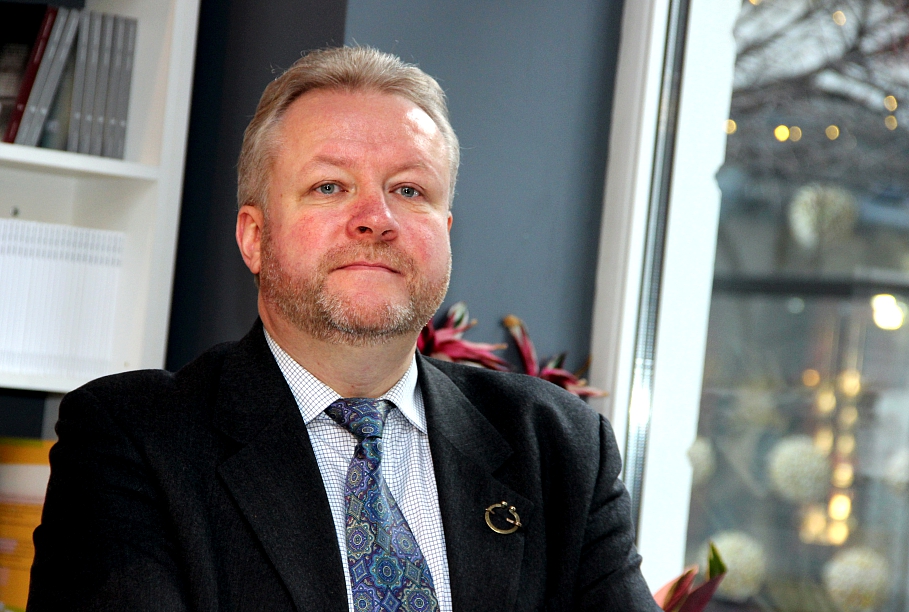Indeed, grilled at the European Parliament's (EP) Legal committee Wednesday, Justice Minister Dzintars Rasnačs and Interior Minister Rihards Kozlovskis were asked how Latvia's Presidency would achieve greater solidarity in the acceptance of refugees, as that is so closely connected to the threat of terrorism. Right now more than 80% of all refugees are being absorbed by only six member-states without much sign of solidarity, and Latvia is no shining example, but it can't go on like this, went the MEP's line of reasoning.
In light of signs of a lack of workers appearing in some sectors of the economy due to the ‘inescapable’ flow of emigration, demographer and Latvia’s representative to the International Migration Organization Ilmārs Mežs also spoke to Latvian Radio about the prospects for immigration into the country Wednesday.
As if in anticipation of the MEP's queries to the Latvian justice and interior ministers, Mežs remarked that some EU members are avoiding acknowledging their obligations of solidarity in the taking on of the wave of migrants overwhelming their counterparts in the southern countries on the Mediterranean.
He said the principle of solidarity would apply in the same way if tens of thousands of refugees were to suddenly pour into Latgale begging for food and warmth. The demography expert also suggested a mere three asylum-seekers could be a sufficiently proportionate undertaking for Latvia to claim it had demonstrated its solidarity with fellow member-states.
“Three persons every year, not three thousand, which would likely be burdensome,” he accented the possibility of helping those whose resources are already well beyond the level of overwhelmed.
Latvia already has 49 asylum-seekers housed at the sole state facility for detained migrants in Mucenieki on the outskirts of Riga, which is about half-capacity there, according to the Citizenship and Migration Affairs Board.
But Mežs pointed out that Latvia will soon need many more people back in its workforce if it expects to remain a dynamically growing member of the continental economy.
“We must remind ourselves that every year a few thousand people actually do immigrate into Latvia. As long as they are just a few thousand, three- or four-, even though they may not be here in the kinds of numbers required for us to feel them as we walk through the central passenger train terminal, as in masses of foreign-looking people, no, that’s not what I mean. I’m talking about those from Russia or Ukraine for now, no different in appearance, say, and coming from lands with ‘related experiences’ to ours, let’s say they don’t stand out from the crowd.
"But I think that we will have immigration, the question is, will we have it only, say up to a ten percent level, calculating for the next generation – i.e. about twenty years or so, that would be a relatively low level of newly-arrived people – between five and ten percent. That’s the optimistic scenario, because without immigration we simply will not be able to make it, no state that doesn’t otherwise want to remain in a cycle of endless crisis can do without immigration. Okay, that may be the choice, if we want to go through these heavy crises every three to five years, then maybe we could survive without immigration,” he suggested.
“But in that case we’d grow the pool of immigrants to match the loss in population from those who haven’t been naturally added, i.e. born into the pool of national residents, and here we’re talking about several hundred thousand people in the course of one generation.
"Politicians are practicing the principle of self-protection in avoiding addressing the issue. In essence, the voter will be the one to punish those politicians who may dare to speak somewhat more openly about these themes.
"I think that Latvia will definitely need this workforce, just talk to any number of major employers, because already today in many sectors there’s an acute shortage of workers. Perhaps it's not going to be felt as acutely in the first three years of this coming generation, up to say 2017, but by 2020 our unemployment rate will have fallen to a minimum.
"How well the state will be able to mobilize the unemployed from distant regions like Latgale, because the jobs will be in and around Riga, or perhaps near a different regional center, and perhaps attract back a segment of those who’ve emigrated away in recent years, but regardless there will be a need for many more additional people in the workforce, inescapably.
"Remigration schemes are a tricky thing, because we’re in a unified European job market, where the salaries are hugely out of balance internally between here and there in our fellow member-states abroad, and so every Latvian from Ireland or the UK looks to see if they can score a job with two to three thousand euros of monthly income, or maybe get by on five hundred to seven hundred given some cheaper costs of living, but the general sense of welfare that people feel is incontrovertibly higher overseas and that is very difficult to overcome.
"Maybe we can hope that, if the Latvian state does nothing in particular to encourage it otherwise, about twenty percent of those ‘economic refugees’ might re-emigrate. A good repatriation plan with sizable grants and supports might raise the percentage another ten points perhaps. But the rest of them we’ll be lucky to see at midsummer when they’re visiting friends and relatives.
"But we must do what we can and we must do more. Of course there’s no magic wand with which to say, as of tomorrow every Latvian earns a thousand euro a month guaranteed. You can’t just give the re-emigrant from Great Britain a privileged thousand euro salary while everyone who stayed home remains in the old boat.”





























